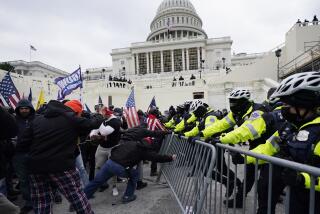FBI Defends Probe of Foes of U.S. Latin Policies
- Share via
WASHINGTON — Under fire from skeptical senators, a high-level FBI official Tuesday defended the agency’s two-year surveillance of critics of U.S. Central American policy as a necessary but ultimately misguided attempt to deter terrorism.
Oliver B. Revell, the bureau’s executive assistant director of investigation, conceded, however, that a primary informant in the agency’s anti-terrorism inquiry furnished many tips that eventually proved “blatantly false . . . concocted out of his own mind” and seriously misled federal investigators.
Critics have charged that the FBI ran roughshod over civil liberties in its investigation of the Committee in Solidarity with the People of El Salvador and other groups. But Revell asserted that the agency had enough justifiable--and nonpolitical--indications to look into allegations that CISPES had acted in concert with the Farabundo Marti National Liberation Front (FMLN), the Marxist Salvadoran guerrilla army.
‘Planning Violence’
“Although our two-year counterterrorism investigation failed to lead to indictments of CISPES members, we did find indications that some CISPES members were at least discussing and planning violence,” Revell said on the opening day of Senate Intelligence Committee hearings on the controversial FBI actions.
He maintained that these plans included disruption of the 1984 Republican National Convention in Dallas and an assassination attempt on President Reagan.
A congressional source familiar with the thousands of pages assembled on the case in past weeks said later, however, that the initial premise for the inquiry came solely from a public CISPES meeting agenda that listed the Republican convention as a single item for discussion, without mention of possible disruption.
This piece of information and others provided by Frank Varelli, a former FBI informant assessed as reliable, “comprised not only a substantial portion of the investigative predicate in the CISPES investigation, but was also used to support the justification for continuation of the investigation” before it was halted in June, 1985, for lack of evidence, according to an FBI report given to the intelligence panel.
Misdirected Investigation
Yet much of the information Varelli offered proved unfounded and “misdirected the investigation,” Revell said.
In sharply worded questioning, several senators challenged the FBI’s decision to investigate some politically related activities based on allegations of terrorist links.
“Where’s the evidence? What are you basing it on?” asked a skeptical Sen. Howard M. Metzenbaum (D-Ohio). The senator answered his own question after the hearing, saying that the FBI “has not met the burden of proof” for treading on the First Amendment rights of CISPES members and their associates.
Should Have Had Facts
In one of the day’s more heated exchanges, Sen. Arlen Specter (R-Pa.), a former district attorney, charged that the FBI should have had “tangible, hard facts” before trailing and photographing U.S. citizens--not just a “strong belief” in terrorist links.
Specter cited an FBI report noting that an April, 1983, bombing in the nation’s capital “occurred during the same time period as a CISPES demonstration in Washington, D.C.” The senator asked wryly if the FBI would next be investigating members of the intelligence panel who also happened to be in town that day.
Revell responded: “If we’d have waited until there was tangible evidence, we’d have been picking up the pieces of the bombs.”
More to Read
Sign up for Essential California
The most important California stories and recommendations in your inbox every morning.
You may occasionally receive promotional content from the Los Angeles Times.












